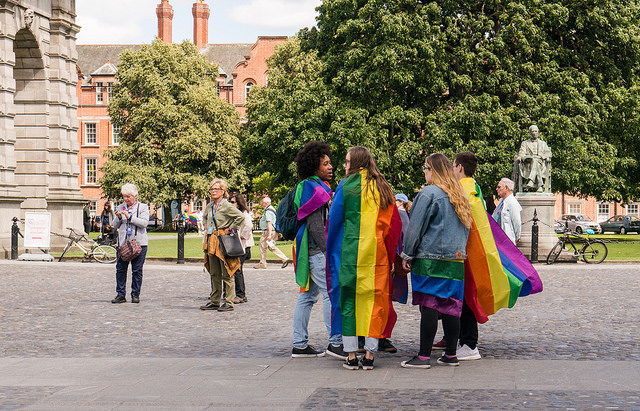Last week, the University of Limerick announced a rainbow housing scheme as an option for queer students. This programme has come under scrutiny by many, who have called the project a means of “segregation” and a step back in the march towards equality. I would argue that this is untrue. This scheme is a positive one, offering LGBT students the opportunity to live in a safe environment with people similar to themselves, eliminating the very real risk of feeling discriminated against or uncomfortable in their own home.
In response to the initiative, tweets fell on both sides of the argument. One user claimed that the programme was just facilitating segregation – to which another user replied: “I just don’t wanna be called a f*g in my kitchen.” Humorous at surface level, it is possibly the strongest argument in favour of the Limerick university’s decision.
All we, as students, want for accommodation is somewhere that feels like home. A safe place to live while we study. Without initiatives like this in place, LGBT students are at risk of being placed in a hostile environment that couldn’t be further from the idea of home. In my own experience, while living in Halls, I once overheard two of my flatmates talking in the hallway, unaware that I was home. They made jokes and belittled a friend they had seen me with, describing them as overly camp, gay and weird.
It was an incredibly uncomfortable situation for me. It made me feel as though my friends weren’t welcome in my apartment for being too gay – they weren’t welcome in my home. It made me question how these flatmates perceived me? All in all, it made my experience there discomforting and it couldn’t have felt further from home. As LGBT people we often “tone down” our “gayness” in public or hide any affection with our partners in fear of receiving abuse. This is bad enough, but to feel like this in your own home is another extreme.
While living in Halls, I once overheard two of my flatmates talking in the hallway, unaware that I was home. They made jokes and belittled a friend they had seen me with
Surely someone should feel comfortable enough to be themselves in their own home – to have who they like over, and to show affection towards their partners without fear of threat. It’s not fair that LGBT students are made to feel uncomfortable in this way and any initiative that aims to eliminate that harm is surely a positive one.
To those who claim the initiative is segregationist and a move against equality, I say there is a misconception of what “equality” means for LGBT people. Often equality is conflated with the idea of assimilation. Some people say that if LGBT people are to achieve equality they should assimilate into mainstream society, adhere to its norms and institutions. But this is not the case, nor is it even possible. The frameworks in which we operate ensure that societal norms – be they patriarchal or heteronormative – remain intact.
It is possible for our community to engage in some of these institutions, such as marriage, but there’s a strong argument that LGBT people can never fully integrate or assimilate into this kind of society.
The equality we seek is one of opportunity, not integration
But that is not to say that we cannot strive towards equality. Because the equality we seek is one of opportunity, not integration. A non-queer student has the opportunity to live in campus accommodation without the fear of being discriminated against or abused due to their sexuality. Without initiatives like this one in UL, a queer student does not have this opportunity guaranteed. There is nothing to say they will not be sharing a room or an apartment with a student who believes that their sexuality is an abomination or something to hate. The programme at UL is offering this equality of opportunity to its queer students.
It’s also important to remember the political and economic climate we currently live in. There is very much a housing crisis and affordable accommodation is scarce across Irish cities, particularly for students. This, in turn, very often forces students to take whatever accommodation they can get regardless of who it’s with. This means a student who’s living with someone who disapproves of them being queer probably has no choice but to put up with it because there’s nowhere else for them to go. This is a great injustice and one that this project helps eliminate.
I personally commend UL for their proactive approach to this issue. Student accommodation and the lack thereof is one of the most pressing issues in third-level education. Making this accommodation more accessible to those of us who have trouble finding a safe, affordable and comfortable place to call home is something to be praised. I honestly believe that Trinity could learn a lesson from UL in this regard.







